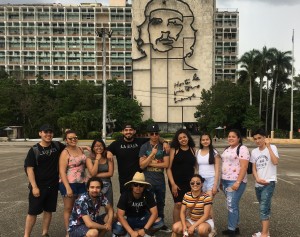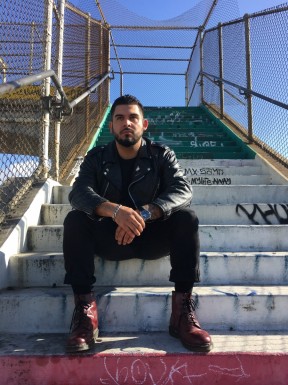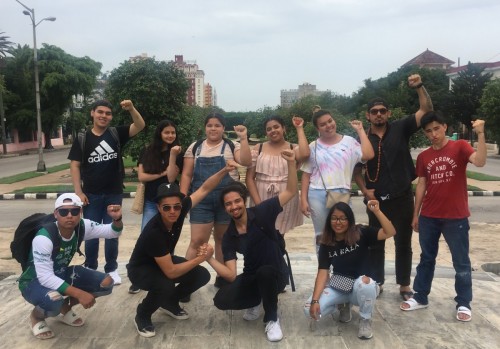
(Guest blog by former RFC beneficiary Davíd Morales)
I remember the exact moment I received the email from school admin, a couple of days before my high school graduation, notifying me that I would not be participating in the commencement ceremony. My heart raced while reading it and then sank at the thought of my immigrant parents, who had sacrificed so much, not being able to see their first child walk across the stage.
The funny thing is that I almost predicted it. It was expected from a principal who would pull me out of class and into her office to interrogate me, question my student activism, threaten me, and if you think you have all the answers, David, then why don’t you just do my job, huh?
My senior year was marked by my political work at Mission Bay High School. At some point during my four years of high school I realized that students like me–brown and working class–were being targeted by military recruiters every single day; they were placed in JROTC courses without consent, were not considered for college-prep coursework, and instead, were trained to shoot rifles at our school’s shooting range. I decided to do something about it and I was punished for doing so.
When I share this story with people they often ask, was it worth it? I tell them that during my senior year we helped pass district-wide policies, in one of the most militarized cities in the country, that effectively ended weapons training and restricted the military’s access to our youth. The truth is that not being able to walk that day only motivated me to continue advocating for my community with even more fervor.
It was also this experience that would bring me in contact with the Rosenberg Fund for Children who would provide me with money for books and college expenses. Being part of the RFC family, attending their youth gatherings across the country, and meeting individuals with a desire for a more just world was the beginning of a series of transformative experiences that led me to the conclusion that true change is only possible through education.
 I am beginning my sixth year as a public high school teacher. I teach culture, language, critical thinking, and rebellion (but really it is 9th and 12th grade Spanish). I taught in East San Jose and San Francisco after receiving my Master’s degree from Stanford but decided to return to my hometown of San Diego. I currently teach in the same district that, ten years ago, denied me the opportunity to participate in my commencement ceremony.
I am beginning my sixth year as a public high school teacher. I teach culture, language, critical thinking, and rebellion (but really it is 9th and 12th grade Spanish). I taught in East San Jose and San Francisco after receiving my Master’s degree from Stanford but decided to return to my hometown of San Diego. I currently teach in the same district that, ten years ago, denied me the opportunity to participate in my commencement ceremony.
While I continue to be active in community organizations like Project YANO (Youth and Non-Military Opportunities) and Colectivo Zapatista, the ability to use education as a tool for social change draws me to the classroom every day. In addition to helping them feel empowered and proud of their cultures and histories, I encourage students to become well-educated advocates of their families and communities. Being civically engaged and organizing against unjust and oppressive policies and systems is celebrated in my classroom.
Last semester my students took on the issue of gentrification in their neighborhood. They developed tools to assess the contribution of new businesses to the rising cost of living and displacement of its residents. After taking to the streets and conducting their gentrification audit, my students presented their findings publicly and proposed solutions to gentrification. I believe the best educational experiences are those that transcend the classroom walls.
For the past three years, I have organized delegations for working class students of color who cannot participate in traditional school trips. These exchanges have all been student-led and made possible through grassroots fundraising.  One year we filled water stations across the Sonoran Desert for migrants who have no other option but to risk it all for the possibility of a better and more dignified life. Another year we learned about collectivism, solidarity, and the legacy of the Cuban Revolution as we met with friends and educators in Havana. This year my students and I organized a trip to Puerto Rico to learn about its colonial relationship to the US and how people are turning to agriculture to achieve autonomy and self-sustainability. I witnessed the minds of my students expand and become ever more curious before my eyes.
One year we filled water stations across the Sonoran Desert for migrants who have no other option but to risk it all for the possibility of a better and more dignified life. Another year we learned about collectivism, solidarity, and the legacy of the Cuban Revolution as we met with friends and educators in Havana. This year my students and I organized a trip to Puerto Rico to learn about its colonial relationship to the US and how people are turning to agriculture to achieve autonomy and self-sustainability. I witnessed the minds of my students expand and become ever more curious before my eyes.
The late Toni Morrison told her students, “When you get these jobs that you have been so brilliantly trained for, just remember that your real job is that if you are free, you need to free somebody else. And if you have some power, your job is to empower somebody else.” This is my goal as a teacher, and I think that it is only through education that we will achieve a world where we can all live with dignity and respect.
I am grateful for my mentors who have believed in me more than my own self. I am grateful for organizations like the RFC who have supported me throughout the critical moments of my career. Finally, I am grateful for my students who continue to humble and inspire me every day.

Comments
Response to blog
I commend you on your strength of spirit and ability to convey the truth to others. You are a true warrior for justice! My cousin has a mantra, “ I am thankful for the challenges in my life for without them I wouldn’t have stumbled across my strengths. “ For those very strong this is true, however too many are so immobilized and dehumanized by the treatment of others that they lose personal confidence, motivation and the optimism that things can change. Your strength of spirit will no doubt do so much for those who hear your voice!